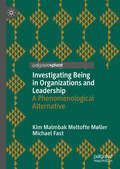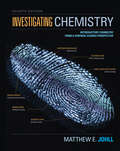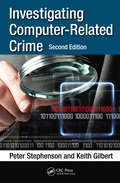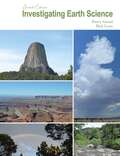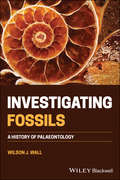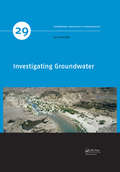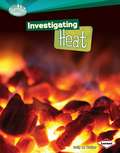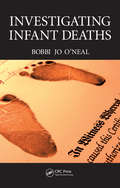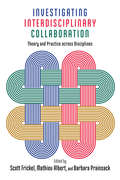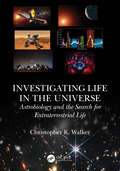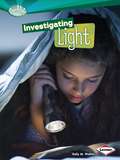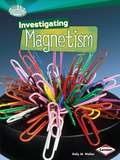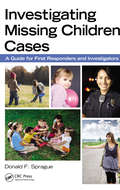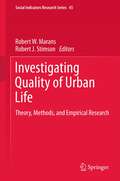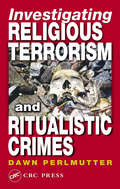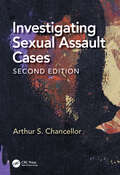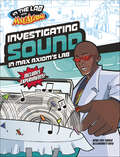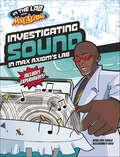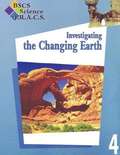- Table View
- List View
Investigating Being in Organizations and Leadership: A Phenomenological Alternative
by Michael Fast Kim Malmbak MøllerThis book discusses the ontological foundation for organizational analysis and organizational life from a phenomenological perspective. The objective of this book is to provide the reader with an understanding of organizations that adequately takes into account the current philosophical knowledge regarding human nature. A key result of this analysis is that organizations are existentially founded human experiences of emotions, ethics, culture and narrative. This understanding of organizations is furthermore complicated by the existence of concepts of power, relationship, interaction and identity, which all can be perceived as contradicting notions of objectivity, professionalism and rationalism. The question is not whether this is an easy description to navigate nor apply, but rather where we go from here. This book would be of interest to students and scholars working on the philosophy of business, and academics in critical organization studies and alternative philosophy of organization. The book would also be of interest to people in all organization trying to understand everyday of dilemmas and contradictions.
Investigating Biodiversity and Interdependence, Student Guide
by National Science Resources Center Amy Charles Max-Karl WinklerNIMAC-sourced textbook
Investigating Chemistry: Introductory Chemistry From A Forensic Science Perspective
by Matthew JohllJohll Investigating Chemistry uses forensic science as a framework to teach chemistry. The inherently fascinating topics of crime and criminal investigations serve as context to teach fundamental chemistry concepts to non-science majors. Capitalizing on student interest in this compelling topic, Johll is able to make learning chemistry exciting and accessible. Each chapter is driven by a case study with details from a real crime scenario, providing an investigative approach to learning chemistry concepts.. The new fourth edition of Investigating Chemistry will include: new content featuring fresh chapter-opening case studies for four chapters. media tools focused on a few key resources that address engagement and reading support, including videos of current events and real-world applications, and LearningCurve reading quizzes. VitalSource e-book.
Investigating Computer-Related Crime
by Peter Stephenson Keith GilbertSince the last edition of this book was written more than a decade ago, cybercrime has evolved. Motives have not changed, but new means and opportunities have arisen with the advancement of the digital age. Investigating Computer-Related Crime: Second Edition incorporates the results of research and practice in a variety of venues, growth in the fi
Investigating Digestion and Motion, Student Guide
by National Science Resources Center Wordwise Inc. Taina LitwakNIMAC-sourced textbook
Investigating Earth Science
by Dusty Girard Rick LynnInvestigating Earth Science is a lab manual designed to meet the requirements of an introductory geology course for non-science majors. <p><p> In order to meet the needs of a broad based geology course many topics are covered including the scientific method, mineral and rock formation and identification, water issues, coordinate systems and mapping, geologic time, the atmosphere, weather and climate, and astronomy. <p><p> This lab manual is designed to complement the lecture component of an introductory geology lecture course to reinforce and enhance student’s understanding of Earth processes, human interaction with our environment and the place of the Earth and humans in our solar system and universe. The major goal of this lab manual is to help students understand the importance of how science works, how scientists think and how science impacts the student’s life on a daily basis.
Investigating Earth Systems: Investigating Our Dynamic Planet
by Michael J. Smith John B. Southard Colin MablyAn Inquiry program that goes into detail about investigating our planet Earth.
Investigating Fossils: A History of Palaeontology
by Wilson J. WallINVESTIGATING FOSSILS INVESTIGATING FOSSILSA HISTORY OF PALAEONTOLOGYInvestigating Fossils – A History of Palaeontology is a concise and accessible look at changing attitudes to palaeontology in general, and fossils in particular. From the existential and philosophical debates arising from fossils – such as their implications for the age of the Earth – to their role as markers in Darwin’s theory of evolution, fossils have been the centre of highly charged debate for over two centuries.This book, which is aimed at anyone with an interest in the history and philosophy of science, not only describes the process of fossil formation and the history of the discovery of fossils. It goes further, and highlights the continuing importance of fossils to our ever-developing understanding of where the planet and its myriad species have come from.Painting a vivid, lively portrait of the history and development of palaeontology, Investigating Fossils is a fascinating and informative tour of the recent history – and possible future – of the science of fossils.
Investigating God's World (4th Edition)
by Matilda Nordtvedt Gregory Rickard Julie Rickard Stephen McalisterThe book investigates the things that you see every day and to know the laws that these objects of nature obey and how they all fit together in God's creation.
Investigating Groundwater (IAH - International Contributions to Hydrogeology #29)
by Ian AcworthInvestigating Groundwater provides an integrated approach to the challenges associated with locating groundwater. Uniquely, the book provides a review of the wide range of techniques that can be deployed to investigate this important resource. Many of the practical examples given are based upon Australian experience but the methods have worldwide applicability. The book is published in colour and includes many original diagrams and photographs. Particular effort has been made to provide consistent terminology and SI units are used throughout the text. <P><P>Investigating Groundwater starts with an introduction to the historical significance of groundwater and gives an account of climate change. A description of the occurrence of groundwater in different rock types is then provided. A detailed account of surface water techniques is then followed by an account of the interconnections between surface water and groundwater. Four chapters describing groundwater hydraulics are then followed by four chapters describing the latest geophysical techniques. Once the best location of a borehole is determined using these techniques; chapters then describe appropriate drilling methods to use; provide a wide ranging review of geophysical logging, hydrochemical and isotopic techniques, before concluding with a detailed description of groundwater flow to a well. <P><P>Written for a worldwide audience of degree level geology/engineering practitioners, academics and students involved in groundwater resource investigation methods; Investigating Groundwater is essential reading for those involved in groundwater research. <P><P>Key Features: <li>Presents the theoretical background and a detailed description of the techniques used in the investigation of groundwater. <li>Describes the general occurrence of groundwater in different rock types; surface water hydrology and interconnected surface and groundwater systems. <li>Provides detailed descriptions of geophysical techniques (seismic, electrical, gravity and heat) and an account of available geophysical logging methods. <li>Reviews hydrochemical and isotope methods, followed by an account of drilling techniques. <li>Gives a detailed account of radial flow to a well, including appropriate modelling and pump-testing techniques and a consideration of non-linear flow. <P><P>Of interest to anyone involved in the development of groundwater resources, either for domestic supply, for agriculture or for mining.
Investigating Heat (Searchlight Books - How Does Energy Work?)
by Sally M. WalkerThe sun, furnaces, and ovens all make heat. But have you ever watched matter expand when it is heated? Or seen how different kinds of matter conduct heat? Now you can! Explore heat with the fun experiments you'll find in this book. As part of the Searchlight Books™ collection, this series sheds light on a key science question―How Does Energy Work? Hands-on experiments, interesting photos, and useful diagrams will help you find the answer!
Investigating Infant Deaths
by Bobbi Jo O'NealMany forensic pathologists and death investigators would agree that infant deaths have historically been poorly investigated. Investigating Infant Deaths provides an in-depth guide featuring 40 case examples that illustrates real-life scenarios in which techniques are put into action. It explains techniques for interviewing grieving parents, how to perform an initial post-mortem exam, what to look for at the incident scene, and the goals of state and local child fatality teams. It also presents suggestions for using doll re-enactments to interview surviving caregivers and witnesses as well as 44 pictures of scenes and unsafe environments.
Investigating Interdisciplinary Collaboration: Theory and Practice across Disciplines
by Helga Nowotny Barbara Prainsack Gregory J. Downey Aaron Panofsky Daniel Lee Kleinman Angela Cassidy Ali O. Ilhan Ayelet Kuper Chisato Fukuda Cyrus C.M. Mody Dave Mcbee Elise Paradis Erin Leahey Hauke Reisch Itai Vardi Jennifer Croissant Laurel Smith-Doerr Mathieu Albert Noah Weeth Feinstein Ryan Light Scott Frickel Sigrid Peterson Timothy Sacco Jimi AdamsInterdisciplinarity has become a buzzword in academia, as research universities funnel their financial resources toward collaborations between faculty in different disciplines. In theory, interdisciplinary collaboration breaks down artificial divisions between different departments, allowing more innovative and sophisticated research to flourish. But does it actually work this way in practice? Investigating Interdisciplinary Collaboration puts the common beliefs about such research to the test, using empirical data gathered by scholars from the United States, Canada, and Great Britain. The book’s contributors critically interrogate the assumptions underlying the fervor for interdisciplinarity. Their attentive scholarship reveals how, for all its potential benefits, interdisciplinary collaboration is neither immune to academia’s status hierarchies, nor a simple antidote to the alleged shortcomings of disciplinary study.
Investigating Life Systems 3rd Edition
by Kendall Hunt Pubishing Company[This book] introduces key ideas from the life sciences. In Unit 1, students examine systems that are in and out of balance and develop a conceptual understanding of systems. In Unit 2, they look at characteristics and causes of variations in populations. They study genetics and patterns of inheritance, as well as the ethical issues associated with genetic engineering. In Unit 3, they look at change in systems by studying the theory of evolution as an example of an idea that has changed over time, as well as a scientific explanation for changes in living organisms. By studying population systems in Unit 4, the students pull together all of these concepts related to living systems and focus on population growth in general, and the human population system specifically, to learn about the interrelationships that influence systemwide changes.
Investigating Life in the Universe: Astrobiology and the Search for Extraterrestrial Life
by Christopher K. WalkerThis textbook gives a lively introduction to the search for extraterrestrial life. It is a guidebook to understanding the possibility of life elsewhere, pointing out landmarks and providing background information to facilitate further exploration of those areas of most interest to the reader. We are a planet of winners – winners of a cosmic lottery that has been in play since the universe began approximately 13.7 billion years ago. Our winnings include sentience and an underlying unease that has driven us to contemplate our place in the universe and the possibility of finding kindred spirits in the cosmos spreading out before us. To understand our origins and the possibility of life beyond Earth, we must look back and retrace the steps that have brought us to this point in space and time. In doing so, we will find the investigation of life to be a unifying theme in nature, requiring us to touch on all branches of the tree of knowledge. Using the Drake Equation as a theme, we begin with an overview of the topic and then go into the story of how we have acquired, or plan to acquire, the knowledge to solve it. As we make our journey, we will encounter some very interesting people – some you will likely know, while others may be new to you. Keep an open mind and allow this text to be your guide. Written in an engaging style, this textbook provides a foundational understanding of the rapidly advancing fields associated with the search for life in the universe. Each chapter includes illustrative figures and review questions for self-study. It will appeal to professionals, researchers, instructors, and undergraduate students, as well as anyone with an interest in astrophysics or astrobiology.
Investigating Light (Searchlight Books: How Does Energy Work?)
by Sally WalkerLooks at what light is, and examines how it interacts with different types of matter.
Investigating Magnetism (How Does Energy Work? Series)
by Sally WalkerLooks at what magnetism is, and examines how magnets interact with different types of matter and with the Earth's magnetic field.
Investigating Missing Children Cases: A Guide for First Responders and Investigators
by Donald F. SpragueTime is an abducted childs worst enemy. Seventy-four percent of abducted children who are murdered are killed within three hours of their abduction. It takes, on the average, two hours for a parent to report a child missing. This gives responders only one hour to get an investigation up and running in an attempt to locate and recover the child ali
Investigating Quality of Urban Life
by Robert J. Stimson Robert W. MaransThe study of quality of urban life involves both an objective approach to analysis using spatially aggregated secondary data and a subjective approach using unit record survey data whereby people provide subjective evaluations of QOL domains. This book provides a comprehensive overview of theoretical perspectives on QOUL and methodological approaches to research design to investigate QOUL and measure QOL dimensions. It incorporates empirical investigations into QOUL in a range of cities across the world.
Investigating Religious Terrorism and Ritualistic Crimes
by Dawn PerlmutterThe legalities of particular religious practices depend on many factors, such as the type of occult or religious activity, the current laws, and the intention of the individual practitioner. Written by the director of the Institute for the Research of Organized and Ritual Violence, Investigating Religious Terrorism and Ritualistic Crimes is the fir
Investigating Sexual Assault Cases
by Arthur S. ChancellorInvestigating Sexual Assault Cases, Second Edition serves as an essential textbook for courses in investigating rape and sexual assault. As with the first edition, this second edition includes the latest research and techniques in coverage of victimology, offender typology, investigative techniques, interviewing, and legal implications. This new, second edition includes chapters on child victims and molestation, sexual homicides as potentially staged events, grooming, interviewing techniques, and same-sex, elder, and special populations as victims of sexual assault. The book fills a current void in the body of literature on the topics of rape and sex crime investigation. Many previous writings, while informative, do not address all the investigative processes necessary for an investigation to be thorough and complete. By providing a fresh approach to the topic, the author aims to augment those writings and, ultimately, improving the reader’ awareness by being much more attuned to the needs of—and taking investigative cures from—the victim. Key Features: Outlines the complete investigative process for sexual assault cases, from evidence collection and interviews to court and legal proceedings Addresses victims and victimology, offender typology, the importance of the investigative interviewing process, and working with attorneys Includes new chapters on grooming, sexual homicides, SAFE examinations, and child-specific interviewing techniques Added coverage looks at same-sex crimes, crimes against men, elder victims, and assault of vulnerable populations In addition to being used in coursework in Forensic Science and Criminal justice programs, Investigating Sexual Assault Cases, Second Edition will serve as an essential reference for police detectives, criminal and death investigators, legal professionals, sexual assault nurses, and those who provide health, and mental health, services to populations experiencing sexual assault.
Investigating Sound in Max Axiom's Lab (In the Lab with Max Axiom)
by Myra Faye TurnerFrom the soft chirping of birds outside to the loud rumble of a roller coaster, our world is filled with sound. Have you ever wondered how sound works and why we can hear it? Here’s your chance to find out! Join Super Scientist Max Axiom in his personal lab to learn all about sound. Then follow along as he demonstrates several fun experiments with sound that you can try at home.
Investigating Sound in Max Axiom's Lab (In the Lab with Max Axiom)
by Myra Faye TurnerFrom the soft chirping of birds outside to the loud rumble of a roller coaster, our world is filled with sound. Have you ever wondered how sound works and why we can hear it? Here’s your chance to find out! Join Super Scientist Max Axiom in his personal lab to learn all about sound. Then follow along as he demonstrates several fun experiments with sound that you can try at home.
Investigating The Changing Earth
by Biological Sciences Curriculum StudyFour modules explore topics in physical science, earth and space science, life science, and science and technology with hands-on activities designed to engage students in the processes of scientific inquiry and technological design. Modules within a developmental level may be taught in any sequence.
